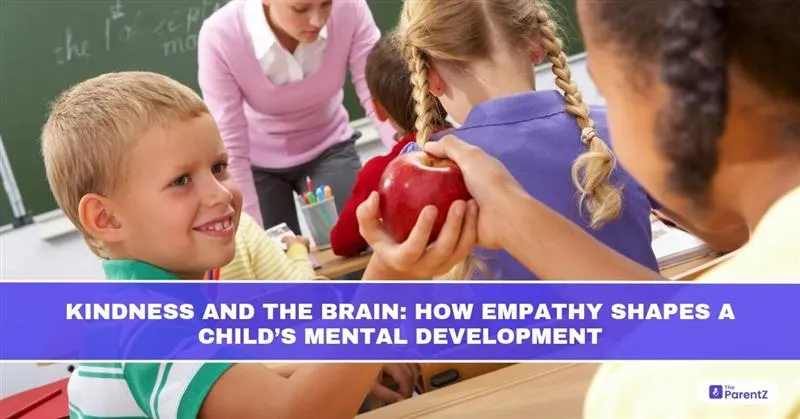“Educating the mind without educating the heart is no education at all.” – Aristotle
As parents, we often prioritize academic milestones, physical growth, and structured discipline when raising children. However, neuroscience and child psychology remind us that one of the most powerful forces shaping a child’s mental development is something far more subtle — empathy.
Empathy is more than just being nice. It is the ability to understand and share another person’s feelings. And this ability, rooted in kindness, isn’t just a moral value; it is a vital skill that influences brain wiring, emotional strength, and lifelong success. Research now shows that children who grow up in emotionally supportive environments where kindness is taught and practiced develop stronger brain circuits associated with emotional regulation, decision-making, and even academic achievement.
What is Empathy in Childhood?
Empathy has two main components:
- Cognitive empathy – the ability to understand what another person might be thinking or feeling.
- Emotional empathy – the ability to feel or resonate with another person’s emotions.
Children are not born with fully developed empathy, but they are born with the capacity for it. This capacity is shaped by both genetics and early experiences. By the age of two, toddlers can begin to show concern for others. By preschool, children can express care, help, and even apologize when someone is hurt, clear signs that the brain is building neural pathways for empathy.
The Neuroscience Behind Empathy and Kindness
Empathy is not just a behavioural trait; it has a biological basis in the brain. Functional MRI studies have identified several regions involved in empathy and kindness:
- Prefrontal Cortex (PFC): This area of the brain helps with decision-making, impulse control, and understanding social behaviour. In empathetic children, this region shows more mature connectivity.
- Anterior Cingulate Cortex (ACC): Plays a role in emotional self-regulation and detecting social errors. Children who are kind and cooperative tend to activate this area more efficiently.
- Mirror Neuron System: These neurons fire both when a person acts and when they observe someone else acting. They help children “mirror” others’ emotions, a core foundation of empathy.
Repeated acts of kindness and exposure to emotional conversations literally strengthen these circuits, much like repeated physical activity strengthens muscles. In fact, studies show that children who consistently practice empathy show increased gray matter density in brain regions linked to emotional and social functioning.
Why Kindness Matters for Mental Development
Empathy and kindness are strongly linked to mental and emotional resilience. Children who are able to understand and respond to others’ emotions are better able to manage their own feelings. This helps in:
- Reducing anxiety and aggression: Empathetic children are less likely to engage in bullying and more likely to form healthy friendships.
- Better academic outcomes: Emotional regulation helps with concentration, problem-solving, and collaboration, all of which benefit learning.
- Improved mental health: Kindness triggers the release of oxytocin, the “feel-good” hormone. This reduces stress levels and enhances a sense of belonging and safety.
These effects are not just temporary. Long-term studies have shown that children who develop strong empathetic skills are more likely to grow into emotionally intelligent, socially responsible, and mentally healthy adults.
Parental Influence: The Home is the First Classroom
Children learn empathy not by lectures but by observing the people around them. This means parents and caregivers play the most powerful role in shaping a child’s capacity for kindness.
Here’s how you can nurture empathy at home:
Talk about feelings: Use everyday moments to name emotions. For example, “That boy looks sad. I wonder what happened.” This helps children build emotional vocabulary.
Encourage perspective-taking: Ask your child questions like, “How do you think she felt when that happened?” It trains their brain to imagine other people’s emotional states.
Praise acts of kindness: When your child helps a friend, shares, or comforts someone, acknowledge it. This reinforces positive behaviour and builds neural memory around empathy.
Avoid harsh punishments: Discipline should be firm but loving. Shame and fear reduce empathy by activating stress pathways in the brain.
Create opportunities to practice: Encourage group activities, family volunteering, and story-sharing. Books and role-play are excellent tools to develop emotional understanding.
The Role of Schools and Society
Empathy doesn’t grow in isolation. Classrooms that focus only on academic competition may undermine emotional learning. That’s why many progressive education systems are integrating Social Emotional Learning (SEL) into the curriculum. These programs teach children how to recognize emotions, resolve conflicts peacefully, and build compassion-based values.
Societal values also matter. Media, peer influence, and online platforms all affect how children view kindness and relationships. Parents can guide children in consuming positive content and discussing what they see online or in movies.
Empathy in Special Contexts: Neurodiverse and Sensitive Children
Some children may naturally struggle with empathy, particularly those with neurodevelopmental conditions like autism. It’s important to understand that these children are not “unkind.” Their brains may process social cues differently. With patient guidance, structured teaching, and therapy when needed, even children with developmental challenges can learn and express empathy in their unique ways. Highly sensitive children, on the other hand, may feel overwhelmed by others’ emotions. They need help learning to set emotional boundaries and self-regulate while still caring for others.
Each child’s brain is different, and kindness can be cultivated in every one of them.
Final Words: Building a Kinder Brain, One Day at a Time
As science continues to explore the brain’s vast landscape, one truth stands out: empathy is a cornerstone of healthy development. When we teach kindness, we are not just shaping behaviour; we are sculpting the brain. Raising kind, empathetic children doesn’t require grand gestures. It’s about everyday moments: listening patiently, validating emotions, showing compassion in front of them, and encouraging them to do the same. In a world that often rushes toward competition and achievement, let’s not forget the quiet power of kindness. It nurtures the brain, softens the heart, and prepares our children not just to succeed but to thrive.






Be the first one to comment on this story.